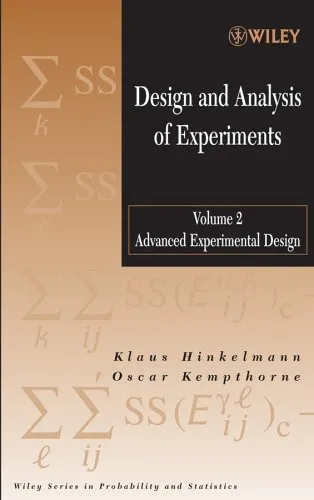Design and Analysis of Experiments, Advanced Experimental Design (Wiley Series in Probability and Statistics) (Volume 2)
4.4
Reviews from our users

You Can Ask your questions from this book's AI after Login
Each download or ask from book AI costs 2 points. To earn more free points, please visit the Points Guide Page and complete some valuable actions.Introduction to "Design and Analysis of Experiments, Advanced Experimental Design"
"Design and Analysis of Experiments, Advanced Experimental Design (Volume 2)" is an authoritative and comprehensive resource tailored for statisticians, researchers, and professionals seeking to deepen their understanding of advanced experimental design principles. Written by Klaus Hinkelmann and Oscar Kempthorne, this book builds upon foundational experimental design concepts, delving into complex methodologies and applications needed for advanced statistical analysis. It serves as a cornerstone reference for anyone engaged in creating, analyzing, and interpreting experimental data in a statistically rigorous manner.
This second volume of the series is not only a theoretical exposition but also a practical guide built on years of research and teaching experience. The authors meticulously cover advanced topics in the design of experiments, ensuring that readers grasp both the mathematical rigor and practical applications. Focused on fostering a deep understanding of experimental systems, it equips readers with the tools necessary to solve real-world problems in science, engineering, agriculture, and beyond.
Detailed Summary of the Book
The book provides a meticulous and detailed exploration of advanced experimental design topics. It begins with an overview of the fundamentals of experimental design, setting a solid foundation for the advanced ideas discussed throughout. Key topics include factorial experiments, random effects models, nested designs, response surface methodology, incomplete blocks, and split-plot designs. The authors also delve into less traditional yet impactful designs such as confounding, fractional replication, and optimal designs tailored for practical applications.
One of the defining aspects of the book is its balanced treatment of theory and applications. Each concept is thoroughly explained with mathematical detail, followed by practical examples from various disciplines. The authors ensure that readers not only understand how to apply these techniques but also why they are necessary in specific research contexts. Alongside the theoretical discussions, there are exercises and problems provided to allow readers to practice and solidify their understanding.
Additionally, statistical computing and data analysis play an important role in modern experimental design. Throughout the book, attention is given to integrating computational tools and methods, showing how statistical software can be used effectively to analyze complex experimental data. The inclusion of detailed discussions on these tools makes the text even more relevant for contemporary applications.
Key Takeaways from the Book
- A thorough understanding of advanced experimental design principles, including factorial and fractional factorial designs.
- Insights into modern methodologies like response surface methods and optimal experimental designs.
- Comprehensive discussions on the statistical modeling of experimental data, including random effects and nested models.
- Practical guidance for applying experimental design techniques to real-world problems in varied disciplines.
- Enhanced ability to critically analyze experimental designs and draw statistically sound conclusions.
Famous Quotes from the Book
"Experimental design is the art of applying statistical principles to ensure the most efficient and meaningful collection of data."
"Good design is not about rigid procedure but about adaptability, ensuring that the experiment serves the purpose for which it is intended."
"There is no substitute for understanding the scientific problem at hand—statistical methods are tools, not solutions."
Why This Book Matters
"Design and Analysis of Experiments, Advanced Experimental Design" is a pivotal text that bridges the gap between theory and practice in advanced statistics. It matters because of its unparalleled depth and clarity, offering readers not just formulas and methods but a deep and lasting understanding of how to effectively design experiments to extract meaningful insights. As research continues to grow in complexity, the ability to design statistically sound experiments becomes increasingly critical across fields such as agriculture, engineering, clinical research, and social sciences.
This book matters for students, researchers, and professionals because it enables them to build confidence in designing experiments and interpreting their outcomes rigorously, ensuring robust scientific findings. Not only does it cater to academic audiences, but its practical orientation also makes it highly relevant to those in the industry applying experimental design to real-world challenges.
By offering a structured roadmap to solving complex experimental problems, this book continues to enrich the toolkit of statisticians and researchers around the globe.
Free Direct Download
You Can Download this book after Login
Accessing books through legal platforms and public libraries not only supports the rights of authors and publishers but also contributes to the sustainability of reading culture. Before downloading, please take a moment to consider these options.
Find this book on other platforms:
WorldCat helps you find books in libraries worldwide.
See ratings, reviews, and discussions on Goodreads.
Find and buy rare or used books on AbeBooks.
1134
بازدید4.4
امتیاز50
نظر98%
رضایتReviews:
4.4
Based on 0 users review
"کیفیت چاپ عالی بود، خیلی راضیام"
Questions & Answers
Ask questions about this book or help others by answering
No questions yet. Be the first to ask!


